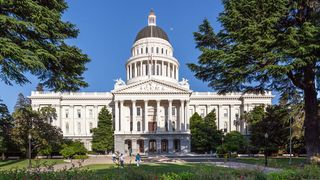Deal Struck to Delay Calif. Net Neutrality Lawsuit, Law

The state of California as well as the Department of Justice and the ISP trade associations that sued the state over its net neutrality reg restoration bill have agreed to put that lawsuit on hold until the resolution of challenges to the FCC's Restoring Internet Freedom net neutrality rule dereg order, according to sources familiar with the negotiations.
The state has also agreed not to enforce the law during deliberations in federal court over the underlying FCC reg rule rollback, which means not only through the D.C. appeals court decision but a potential Supreme Court challenge if it came to that. A D.C. circuit decision is not expected until sometime next year.
They have asked the court, A U.S. District Court for the Eastern District of California, to accept their agreement and delay the suits.
ISPs are hoping that before all that happens, Congress will get together on legislation to clarify the government's authority to regulate the internet of everything.
“The Internet is inherently an interstate information service, as the Supreme Court has recognized, which means that only the federal government can set policy in this area. A patchwork of state laws only introduces uncertainty in the broadband marketplace that will slow investment and deployment of infrastructure and hurt consumers. I am confident that the FCC’s authority to preempt such state laws will be upheld, along with our proven market-based framework for protecting Internet openness, investment, and innovation nationwide.”
"In filings with the U.S. District Court for the Eastern District of California, California has agreed not to enforce its new Internet regulation law pending the resolution of a petition for review of the FCC’s Restoring Internet Freedom Order in the U.S. Court of Appeals for the District of Columbia and any subsequent proceedings before the U.S. Supreme Court, the FCC confirmed. "All parties have requested that further proceedings in the District Court be stayed pending final resolution of that litigation. The agreement must be approved by the District Court."FCC Chairman Ajit Pai applauded the pause in enforcement.
“I am pleased that California has agreed not to enforce its onerous Internet regulations," he said. "This substantial concession reflects the strength of the case made by the United States earlier this month. It also demonstrates, contrary to the claims of the law’s supporters, that there is no urgent problem that these regulations are needed to address. Indeed, California’s agreement not to enforce these regulations will allow Californians to continue to enjoy free-data plans that have proven to be popular among consumers."
Multichannel Newsletter
The smarter way to stay on top of the multichannel video marketplace. Sign up below.
Related: Amazon Slams California Privacy Law
Both the Trump Administration and, collectively, the NCTA-The Internet & Television Association, American Cable Association, CTIA and USTelecom filed suits against the new California law, which was signed by Gov. Jerry Brown Sept. 30—it passed Aug. 31.
The law essentially restored the bright-line rules against blocking, throttling and paid prioritization that the FCC under chairman Ajit Pai had eliminated in the Restoring Internet Freedom Order last fall. The California law went even further, extending them to interconnections, which the FCC's 2015 Open Internet order, which implemented the bright-line rules, didn't even do.
Related: Court Boosts FCC's Case in Net Neutrality Fight
The Restoring Internet Freedom order also made clear it preempted state efforts to re-regulate ISPs.
Mozilla joined by others sued the FCC over that net neutrality deregulation an effort to restore on the federal level the rules California restored in the state, with oral argument in that Mozilla V. FCC suit unlikely before early next year.
California law was to have gone into effect Jan. 1.
Contributing editor John Eggerton has been an editor and/or writer on media regulation, legislation and policy for over four decades, including covering the FCC, FTC, Congress, the major media trade associations, and the federal courts. In addition to Multichannel News and Broadcasting + Cable, his work has appeared in Radio World, TV Technology, TV Fax, This Week in Consumer Electronics, Variety and the Encyclopedia Britannica.

